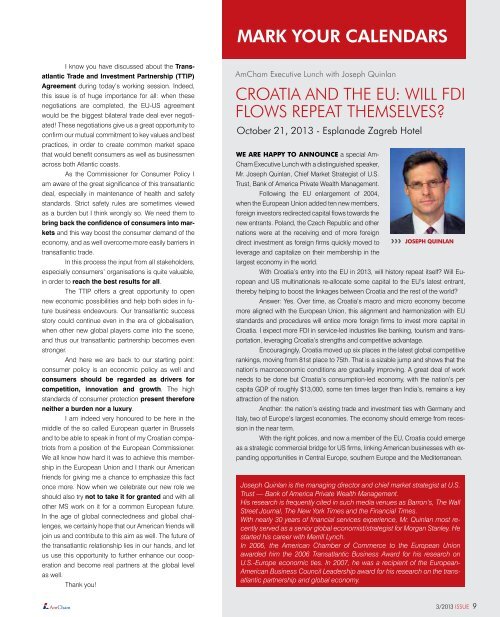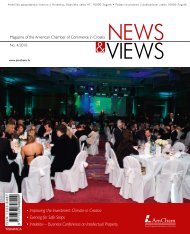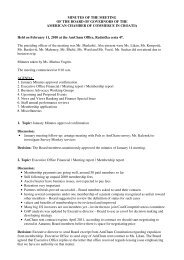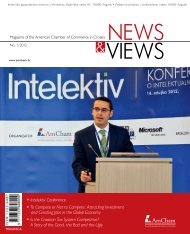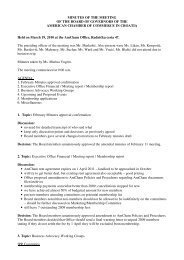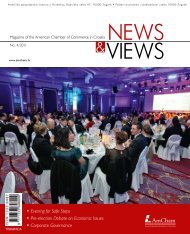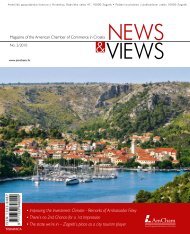No. 3 / 2013 - AmCham
No. 3 / 2013 - AmCham
No. 3 / 2013 - AmCham
- No tags were found...
Create successful ePaper yourself
Turn your PDF publications into a flip-book with our unique Google optimized e-Paper software.
MARK YOUR CALENDARSI know you have discussed about the TransatlanticTrade and Investment Partnership (TTIP)Agreement during today’s working session. Indeed,this issue is of huge importance for all: when thesenegotiations are completed, the EU-US agreementwould be the biggest bilateral trade deal ever negotiated!These negotiations give us a great opportunity toconfirm our mutual commitment to key values and bestpractices, in order to create common market spacethat would benefit consumers as well as businessmenacross both Atlantic coasts.As the Commissioner for Consumer Policy Iam aware of the great significance of this transatlanticdeal, especially in maintenance of health and safetystandards. Strict safety rules are sometimes viewedas a burden but I think wrongly so. We need them tobring back the confidence of consumers into marketsand this way boost the consumer demand of theeconomy, and as well overcome more easily barriers intransatlantic trade.In this process the input from all stakeholders,especially consumers’ organisations is quite valuable,in order to reach the best results for all.The TTIP offers a great opportunity to opennew economic possibilities and help both sides in futurebusiness endeavours. Our transatlantic successstory could continue even in the era of globalisation,when other new global players come into the scene,and thus our transatlantic partnership becomes evenstronger.And here we are back to our starting point:consumer policy is an economic policy as well andconsumers should be regarded as drivers forcompetition, innovation and growth. The highstandards of consumer protection present thereforeneither a burden nor a luxury.I am indeed very honoured to be here in themiddle of the so called European quarter in Brusselsand to be able to speak in front of my Croatian compatriotsfrom a position of the European Commissioner.We all know how hard it was to achieve this membershipin the European Union and I thank our Americanfriends for giving me a chance to emphasize this factonce more. <strong>No</strong>w when we celebrate our new role weshould also try not to take it for granted and with allother MS work on it for a common European future.In the age of global connectedness and global challenges,we certainly hope that our American friends willjoin us and contribute to this aim as well. The future ofthe transatlantic relationship lies in our hands, and letus use this opportunity to further enhance our cooperationand become real partners at the global levelas well.Thank you!<strong>AmCham</strong> Executive Lunch with Joseph QuinlanCroatia and the EU: Will FDIflows repeat themselves?October 21, <strong>2013</strong> - Esplanade Zagreb HotelWe are happy to announce a special Am-Cham Executive Lunch with a distinguished speaker,Mr. Joseph Quinlan, Chief Market Strategist of U.S.Trust, Bank of America Private Wealth Management.Following the EU enlargement of 2004,when the European Union added ten new members,foreign investors redirected capital flows towards thenew entrants. Poland, the Czech Republic and othernations were at the receiving end of more foreigndirect investment as foreign firms quickly moved to ››› Joseph Quinlanleverage and capitalize on their membership in thelargest economy in the world.With Croatia’s entry into the EU in <strong>2013</strong>, will history repeat itself? Will Europeanand US multinationals re-allocate some capital to the EU’s latest entrant,thereby helping to boost the linkages between Croatia and the rest of the world?Answer: Yes. Over time, as Croatia’s macro and micro economy becomemore aligned with the European Union, this alignment and harmonization with EUstandards and procedures will entice more foreign firms to invest more capital inCroatia. I expect more FDI in service-led industries like banking, tourism and transportation,leveraging Croatia’s strengths and competitive advantage.Encouragingly, Croatia moved up six places in the latest global competitiverankings, moving from 81st place to 75th. That is a sizable jump and shows that thenation’s macroeconomic conditions are gradually improving. A great deal of workneeds to be done but Croatia’s consumption-led economy, with the nation’s percapita GDP of roughly $13,000, some ten times larger than India’s, remains a keyattraction of the nation.Another: the nation’s existing trade and investment ties with Germany andItaly, two of Europe’s largest economies. The economy should emerge from recessionin the near term.With the right polices, and now a member of the EU, Croatia could emergeas a strategic commercial bridge for US firms, linking American businesses with expandingopportunities in Central Europe, southern Europe and the Mediterranean.Joseph Quinlan is the managing director and chief market strategist at U.S.Trust — Bank of America Private Wealth Management.His research is frequently cited in such media venues as Barron’s, The WallStreet Journal, The New York Times and the Financial Times.With nearly 30 years of financial services experience, Mr. Quinlan most recentlyserved as a senior global economist/strategist for Morgan Stanley. Hestarted his career with Merrill Lynch.In 2006, the American Chamber of Commerce to the European Unionawarded him the 2006 Transatlantic Business Award for his research onU.S.-Europe economic ties. In 2007, he was a recipient of the European-American Business Council Leadership award for his research on the transatlanticpartnership and global economy.3/<strong>2013</strong> ISSUE 9


